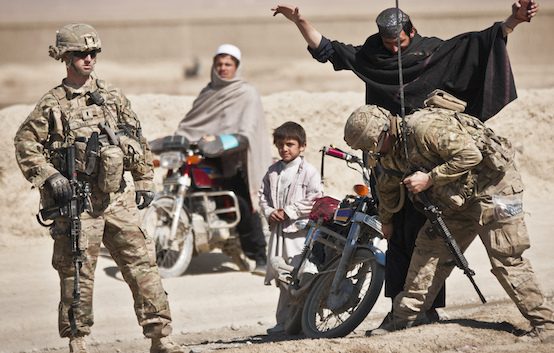The Afghanistan War’s #MeToo Moment

Is the Afghanistan War state going through its own #MeetToo moment?
Anyone who has been in Washington long enough knows that the first to speak against the accepted orthodoxy of “the body” is most certainly punished—a sacrificial lamb of truth—but once there’s safety in numbers, shifting positions and indulging in alternative thinking becomes not only acceptable, but a fashionable totem of reinforcing one’s place in the establishment. For example, when Rep. Ron Paul said the Iraq War was a failure he was flayed by his own party as a conspiratorial old coot. Now anyone who doesn’t acknowledge openly that it was a failure isn’t a serious analyst.
We may be seeing this brand of imperial city theater play out before our eyes with the recently released “Afghanistan Papers.” Most of us at TAC will recognize that The Washington Post has long taken a less than aggressive if not unquestioning approach to reporting the military strategy in Afghanistan War—from the initial installation of Hamid Karzai as president, to the hapless reconstruction and training of the Afghan Army, to the illegal drone war and steady redeployment of troops degrading the forces year over year over year. While many of its reporters have been tough in ferreting out stories, they were routinely drowned out by the showcasing of one establishment mouthpiece after the other on the paper’s editorial pages, sounding the alarms against withdrawal, citing phony metrics, playing down the Taliban’s rise. The paper, in essence, was part of the problem, like all of the major corporate mainstream media siding with power and dutifully regurgitating the justifications for endless war.
Now, in releasing the Afghanistan Papers they have not only unshackled themselves from further servitude to the lies, but the newspaper has seemingly liberated hundreds if not thousands of military personnel, soldiers, contractors, diplomats and other Deep State blobbies who, sensing safety in numbers, are now, after nearly 18 years, ready to call out the emperor’s naked adiposity.
The canary in this coal mine is a piece published Sunday in the Post by Lauren Kay Johnson, a former public affairs officer for the Air Force who served in Afghanistan from 2009 to 2010 and is now writing a memoir of her service. She was not one of the hundreds of people who spoke to the Special IG for Afghanistan (SIGAR) about “lessons learned,” but now that those interviews have gone public she is apparently confident coming forward.
From July 2009 to March 2010, I served as one of the U.S. Air Force’s designees for a nation-building mission, and I witnessed the disconnect between what happened on the ground and the messages the public heard about it. As my team’s information operations officer, I played a direct role in crafting those messages. I employed “strategic communication” during events like the 2009 Afghan presidential election and directed embedded reporters to only the sunniest stories, keeping them away from disgruntled troops who might not stick to tidy talking points. But my job wasn’t only to mislead the American public: Our information campaign extended to the Afghan people and to higher-ups within the American military itself.
Expect these stories to rush in like a flood waters after a dam has broken. Make no mistake, we should be happy when this kind of levy has been breached. And we certainly can’t start blaming 25-year-old PAOs for not taking a stand against their superiors. But it was 10 years ago, and she is out of the military now. In fact a lot of people have been in and out of the military, State Department, and associated War State positions since 2002. They’ve had a lot of time to reflect, speak up, and confirm a lot of the things that many of us were writing about for years. But the vast majority did not and have not, and that is why we are where we are today.
I think of people like Gian Gentile, who as an active duty officer and professor at the Army War College, engaged in daily public dust-ups with blobby national security analysts over what he called the futility of COIN (counterinsurgency), in Iraq, Afghanistan, or anywhere else. He wrote a book about it six years ago. I am thinking about Matthew Hoh, a Marine combat veteran and political officer in the foreign service who resigned his State Department publicly in protest of the Afghanistan war policy in 2009. I’m thinking about Lt. Col. Daniel Davis, who was active duty Army when he wrote his own reports about how the generals were lying about the successes in Afghanistan, got them published, and sent them to Congress in 2012.
This is not to take away from the critical importance of the Post reporting. Having hundreds of officials on the record saying the war effort became a cess pool of corruption, a feeder for terrorism, an abomination of basic military strategy, is a game changer. Hopefully. But remember as you hear the expected exclamations of “me too,” laced with the sense that “I knew all along,” or worse, “we all knew,” that they never said a word when they had the chance. When it could have made a difference.
Comments